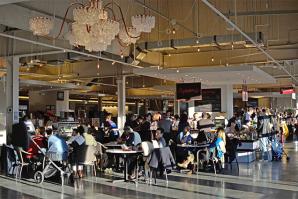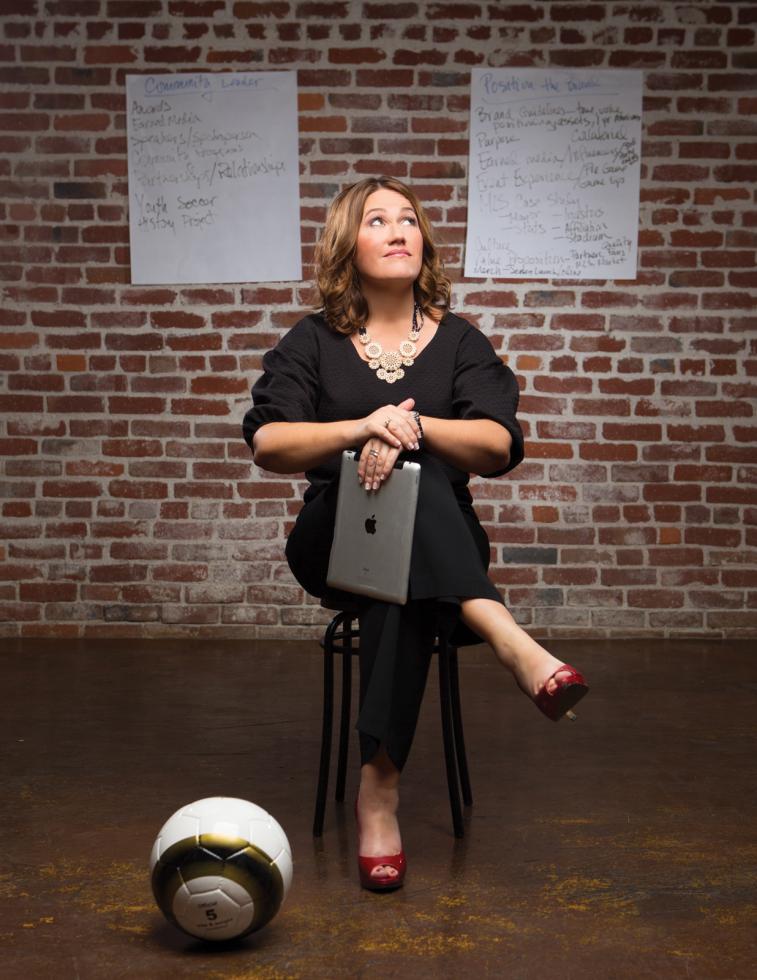She has spent much of her 19-year career
Erika Bjork, 38, is the vice president of marketing and communications for Sacramento Republic FC. She has spent much of her 19-year career specializing in business development and branding strategies in the sports industry, including stints with the Sacramento Kings and Monarchs, the Oakland Raiders and now Sacramento’s new professional soccer team. Bjork is a founding member of Metro Edge, the under-40 program of the Sacramento Metro Chamber. The chamber recently named her the 2013 Young Professional of the Year, and the Sacramento Business Journal selected her as one of its 2013 40 Under 40 winners.
We don’t create brands, we discover them. That’s what the chamber and other groups are trying to do with the regional branding effort. The brand is already out there. We just have to capture the vibe and then present it in a short, storytelling way.”
“People think about brands as simply slogans and logos. It’s really not. It’s really about discovering the true essence of the subject and then determining how you position that feeling. Sacramento’s regional leadership has finally come to the realization that we have yet to fully identify and define what’s great about this place.”
“The successful Philadelphia brand (PHL) is owned by none and embraced by all. So there’s an understanding that no one entity owns the region’s brand. That’s an understanding that we don’t yet have here. Everyone here is still trying to hold onto their little piece. There are still too many turf battles going on. If that continues, we will all suffer. Economic development promoters throughout the region have to realize that if they give up a little control they’re going to gain a lot.”
At the end of the day, if the city of Sacramento and its downtown become branded, then the entire region becomes branded. You can still tell individual stories about each part of the region, but there needs to be a core brand to any destination marketing strategy. The economic development department in Denver does a very good job of this. When they look to recruit a large employer to the Denver area, they do it from a point of view that once they get them to Denver, they’ll look at the city, the surrounding region and neighborhoods to see what works best.”
“We are almost apologetic about being the capital city because people point fingers at the dysfunctional politicians. We need to get past that. Instead, we need to share what makes us passionate about this city and the surrounding region. If the city’s branding effort is successful, our image will change from being a cow town to being one of the most important and influential regions in America. We shouldn’t be apologetic of our city. We should be real proud. I look forward to the day that I’m traveling in Paris and someone asks me where I’m from; I will tell them Sacramento. And then they’ll respond by saying, ‘Oh, I’ve always wanted to visit there.’”
“When describing Sacramento to outsiders, I use the word passionate a lot. First and foremost, I love the people here. The people I’ve met over my career here are just incredibly passionate about the region. And their passion is very genuine, as we’ve seen expressed recently in the farm-to-fork effort, the fight for the Kings, the downtown arena and many other things. You don’t feel that down-to-earth passion in many other cities.”
“I would make the argument that Sacramento is a world-class city. People have different definitions. Some look mostly at the size of the city. To me, we offer everything, to a smaller degree, that Paris does. We have historical architecture, two rivers, art museums, tree-lined business avenues and neighborhoods. Great cities use to be almost solely judged on their architectural features, such as the Eiffel Tower. Today, great cities are judged by their ability to be a gathering place. Sacramento excels at that with the Capitol and the American River Parkway. The addition of a state-of-the-art downtown entertainment and sports center will only add to that.”
“Like it or not, state government is downsizing. For the longest time, state jobs provided economic stability for the entire region. It was a safety net that led local government leaders to become risk averse. If we are to succeed, local elected officials have to start executing creative ideas and taking the necessary risks. If we do that, the new arena will be built. A downtown renaissance will occur. The railyards will get built, and, most importantly, private money will be invested. Perhaps then the region will develop the swagger needed to become an internationally renowned center of commerce.”
“A goal is a dream with a deadline. At least that’s what we believe at Sacramento Republic FC. There is nothing passive about (team founder and president) Warren Smith’s approach to business. He’s not one of those guys that’s worried about possible barriers. He breaks through them and makes things happen. He has publicly set a goal of having a major league soccer team playing in Sacramento by 2016. A lot of locals are saying, ‘Perhaps you should hedge your bet.’ He’ll have nothing to do with that. Hence our branding campaign: Indomitable City. Indomitable Club.”
“I’m very proud of how Metro EDGE has developed. As little as two years ago, the business community was still not talking about or taking notice of the young professionals here. Political and business discussions centered on the same leaders and the same decision- makers. That landscape of leadership is in for a dramatic upheaval. Early signs of that are the election of Steve Hansen to the city council, and entrepreneur Chris Johnson and his Mark Cuban-invested Rapid Ramen company.”
“The millennials have arrived. It’s no longer going to be all about the baby boomers. The millennials will soon comprise more than 50 percent of the workforce. They’re going to be the No. 1 purchaser of luxury items. They are going to be the economic drivers of our society. And they are going to change the norm for how we live and work.”
“Our country is now very much being driven by a young, creative and entrepreneurial spirit. The ideas, technology and innovation for future intellectual property are being developed here. We’ll have someone else manufacture it. The development of intellectual property is the most valued item we provide for the rest of the world. That’s what you’re seeing coming out of the millennial creative class.”
“I was working 80 to 100 hours a week for the first eight years of my career. That was how you paid your dues. You would send and respond to emails at 3 a.m. because you wanted all your supervisors to know how hard you were working. People are now realizing that’s not productive. With this approach, we are burning out good young minds and ending working relationships. European countries are just as productive as the U.S., and they don’t work half those hours.”
“The millennials are the first generation to put quality of life over career. They also are just as concerned about the place they’re going to live as they are about the actual job. They want the quality of life that comes from living and working in good neighborhoods within a vibrant community. They want a work environment that is creative, social and flexible. They’ll be productive and get their work done, but they also want a life. I’m a perfect example of that. I rarely take a sick day — but if the ski conditions are perfect up in Tahoe, I may take a snow day.”
“As a people, we just don’t socialize that much anymore. In too many workplaces, the attitude is ‘I don’t want to be here. I just want to go home.’ I prefer offices where we take a coffee break in the morning and frequently meet after work for beers. I’m on a personal mission to change the attitude through my involvement with Metro EDGE and by throwing dinner parties at my house on a regular basis.”
Recommended For You

Sacramento Needs a Public Market
The Farm-to-Fork Capital is incomplete without one
Great food capitals of the world: Can you name them? Florence. Paris. Tokyo. Barcelona. Istanbul. Singapore. What do these destinations of culinary delights offer?

Go Time
Hey Sacramento, let’s stop talking and get something done.
You may have recently noticed some random references to JFDI. Maybe it was in a tweet or a sticker on the back of a cell phone. The initials stand for Just F*cking Do It. It isn’t a new movement or an acronym from a New York Times Best Seller. It represents an attitude, a mindset and — most importantly — an unwavering willingness to act.



